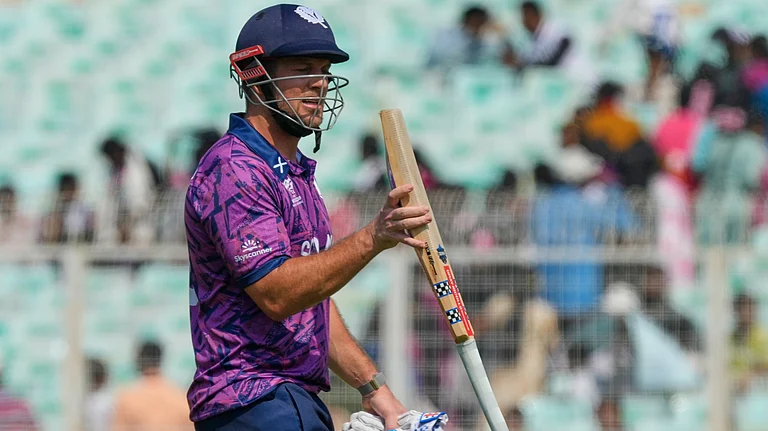If you have the courage to accept that you have been soundly beaten in a battle, you can at least go on to plan a fitting response in the war. But if you insist on presenting a defeat as a victory, however Pyrrhic you are willing to concede it to be, then you rule out even the option of turning the defeat into a later victory. That is what the Vajpayee government is doing today. One refrain keeps creeping out of the mewling of government spokesmen in the aftermath of Kandahar: "We only had to give up three prisoners. It was the best bargain we could strike. The hijackers were threatening to take the plane up in the air and blow it up. They had RDX in the baggage hold. We simply could not take a chance with 160 lives. We are a democracy. Peoples lives matter."
This excuse highlights both the governments lack of nerve and the absence of even an elementary knowledge of psychology in the so-called crisis management and hostage negotiating teams. IC 814 would not have been blown up in the air because blowing the plane up would have killed not only the passengers but also the hijackers. Did either of these august sounding bodies consult a single psychologist to assess how seriously to take this threat? Did they ask a single person who had dealt with hostage negotiations in the past to come on board for the negotiations? Did they ask the FBI, the British police or Israeli intelligence, who have extensive experience of kidnapping and hostage recovery operations, for advice on how to deal with the hijackers? Did they have any statistics on past hijackings and kidnappings? Did they have a tally of how many ended in the suicide of the hijacker? Did they have a tally of how many times a group of hijackers, especially a group as large as this one, had collectively committed suicide? When all of this data could have been had from any one of the above sources in as little as half an hour, what right had the crisis management team and Jaswant Singh to humiliate an entire nation, demoralise its hard-pressed security forces and give an enormous psychological boost to the enemies of India without doing their elementary homework?
Even if the hubris of Indian bureaucrats made it impossible for India to reach out to others for help, what does the handling of the crisis tell us about their competence? The answer is unprintable. Too much has been written about the governments bungling and timidity at Amritsar. Most of it is not justified because it is based on 20-20 hindsight.
Commandos could not have been kept ready at the airport since no one knew in advance that the plane would have to land there or for that matter anywhere else in India. If anyone is to blame, it is a pusillanimous airport manager at Amritsar who lacked the courage to surreptitiously block the runway on his own initiative and give Indian commandos time to get there. But the fact is that the plane could have been stopped at Amritsar only at the cost of several lives, for the hijackers were close to panic at the time. The governments best chance to get the plane and the hostages back without making concessions arose not then but at Kandahar. As one lone voice, that of K.P.S. Gill, kept insisting, with every day that passed, the chances of securing a simple exchange of hostages for hijackers improved. Gill is one of the few people in India who has had actual experience of hostage negotiations, but one did not need to be a trained psychologist to understand this. What the passengers have said about the hijackers behaviour on the plane-the care they took to hide their identities and their scrupulous use of aliases-shows that they had absolutely no intention of dying. But even if the negotiators didnt know this to start with, did it not occur to them to ask themselves just how many times in the entire history of hijacking had a group of hijackers taken a cold-blooded decision to blow themselves up? The answer is, never. Suicide is a singular act. That is why all Tamil suicide bombers in Sri Lanka and India have been loners. Collective suicide is unknown except in rare cases of total submission to the will of a religious messiah, such as happened several years ago at Jonestown.
In the case of the hijackers of flight IC 814, by December 27 or 28 the possibility that they would commit collective suicide had ceased to exist. By then, theyd become used to the security provided to them by the Taliban and were looking forward to living a normal life again. From there a cold-blooded return to death by suicide was simply not possible. Even had one of them been sufficiently committed to the cause to be willing once more to die for it, he would have been overruled by the others. Even had Pakistan ordered them to do so, they would have refused. In the end, the plane would either have taken off to search for another place to land or, what is far more likely, the hijackers would have abandoned the plane and their hostages in the dead of night and melted into the Afghan countryside.
All this would have become clear to our much-vaunted negotiating team had they called the hijackers bluff and ended negotiations. But its members did not have the courage to do so even once. It is the contrast between this cowardice and the daring of the hijackers and cold-blooded preparedness of their Pakistani masters to gamble all on their assessment of the Indian psyche that has earned the Vajpayee government the worlds contempt. The lack of sympathy is palpable in the coverage of the aftermath of the hijacking in the global press. It is apparent in the unwillingness to condemn Pakistan even when all the circumstantial evidence points at them. Unfortunately, the price of cowardice will not be paid by Vajpayee and his cabinet. It will be paid by Indian soldiers and policemen in Kashmir and by simple Kashmiri civilians like the old vegetable seller filmed by BBC, who had to live to see his son die.























